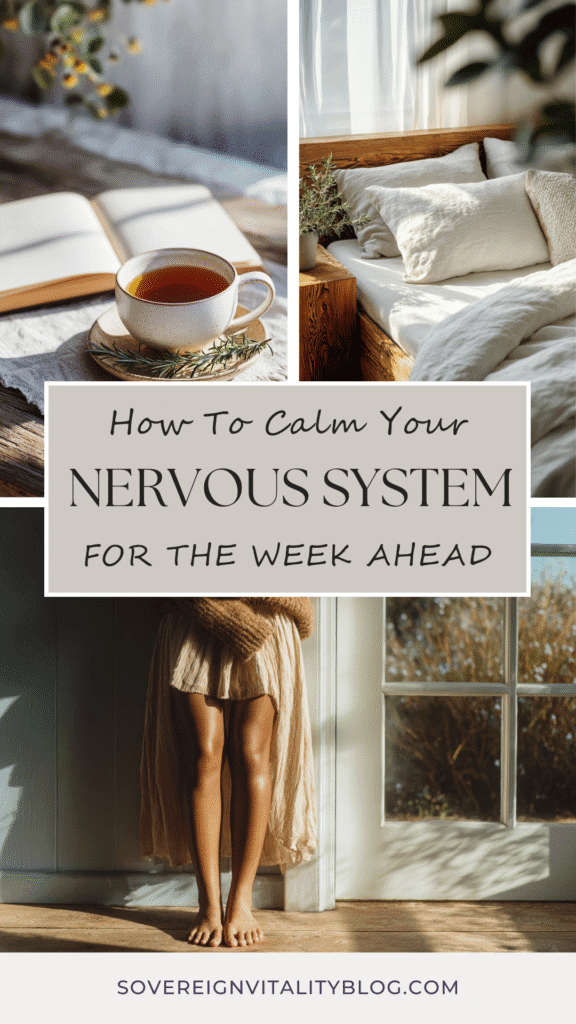This post may contain affiliate links, including those from Amazon Associates. If you make a purchase through these links, I may earn a commission at no additional cost to you. Learn more about our affiliate policy.
Before I began tending to my nervous system, Sunday afternoons always felt charged with subtle anxiety.
I would sit down with my planner, pens lined up neatly, but instead of clarity and calm, I’d feel pressure building.
My body would tense slightly, breath shallowing as I anticipated a week’s worth of commitments.
Instead of entering the week feeling centered, I’d start Monday morning already braced, reactive to the slightest change or disruption.
It wasn’t until I discovered that planning is not purely about productivity but also about regulating my nervous system, that I began to shift my approach.
I realized a calm, regulated body supports clarity, adaptability, and steadiness throughout the week. Planning became less about filling every space on my calendar and more about gently creating space for what truly nourishes and sustains me.
If Sunday evenings often leave you feeling restless, overwhelmed, or anxious about the upcoming week, you’re not alone.
Your nervous system is signaling that it needs preparation too, not just through planning tasks, but by grounding, settling, and setting rhythms of calm and clarity.

For deeper support in creating an overall routine that supports your nervous system, I invite you to explore my full guide: How To Create the Ultimate Sunday Reset for Your Nervous System.
For now, here’s a simple, five-step rhythm I use every Sunday to prepare my nervous system for the week ahead.
Why Your Nervous System Needs Preparation Too
Sunday anxiety often shows up as tension, restlessness, or even subtle dread.
This feeling typically arises because our nervous systems sense the approach of new demands, responsibilities, and unpredictable stressors.
When our nervous systems aren’t properly regulated before planning, we tend to overcommit, driven by urgency or fear rather than genuine intention. This leads to:
- Feeling frazzled or rushed through tasks.
- Anxious anticipation of Monday mornings.
- Physical tension in the body (tight shoulders, jaw clenching, shallow breath).
- Difficulty transitioning smoothly between tasks or meetings.
- Reactivity rather than mindful responsiveness.
If you notice yourself feeling consistently anxious or exhausted by Sunday evening, you might find my post 7 Signs You Need a Nervous System Weekend Reset helpful as a starting point.
1. Start With Stillness, Not To-Dos

Before you even pick up your planner, begin by settling your nervous system. Stillness doesn’t have to mean complete inactivity; instead, it’s about gently quieting your internal pace.
When you first sit down on Sunday afternoon, try one of these nervous system grounding practices:
- Deep breathing exercises: Try physiological sighs (two quick inhales followed by a long exhale) or simple box breathing (inhaling, holding, exhaling, and holding for equal counts of four).
- Grounding outdoors: Spend 10 minutes barefoot in grass or taking a slow, mindful walk around your neighborhood.
- Warm sensory grounding: Hold a cup of herbal tea or warm water in your hands, allowing the sensation of warmth to soothe your system.
- Ambient sound therapy: Play nature sounds or a calming instrumental playlist in the background as you transition into your planning session.
The goal here is not productivity but presence. By first signaling safety and stillness, your nervous system shifts from vigilance and tension into receptivity and calm.
2. Create a Supportive Environment

Our physical environment deeply impacts how regulated we feel.
Often, just a few sensory cues can transform your planning environment into a supportive space for your nervous system.
As you begin your planning, consider these simple shifts:
- Essential oils: Diffuse calming oils like bergamot, lavender, or rosemary, which gently support mental clarity and emotional balance.
- Lighting: Move your planning area to a location with soft, natural light or adjust lighting to a warmer, softer tone.
- Sounds: Continue with soft instrumental music or ambient soundscapes, maintaining a soothing auditory environment.
- Comfort: Sit in a comfortable chair or cozy spot, not your work desk. You might even place a blanket over your legs or wear your coziest sweater as subtle sensory reminders of rest and comfort.
For more tips on creating an environment that soothes your nervous system, you can visit my post How To Create a Nervous System Sanctuary at Home.
3. Reframe Weekly Planning as Nervous System Care

Traditional planning often carries a hidden agenda of perfection or performance. It can push us into a heightened state of alertness or anxiety.
Instead, reframe your planning session as a nourishing ritual to clear internal and external clutter, creating space for genuine rest, connection, and ease during your week.
Here’s how to structure a planning session around nervous system support:
- Start with capacity, not tasks: Before writing down tasks, briefly check in with yourself: How much energy and emotional bandwidth do you realistically have this week?
- Identify your 1–3 nervous system priorities: Maybe these are meals, morning quiet time, or evening wind-downs. Block these times into your calendar first, prioritizing your body’s needs.
- Simplify your commitments: Resist filling every available time slot. Instead, allow some whitespace each day for rest or spontaneous calm.
- Incorporate anchor points: Schedule brief, regular moments that consistently signal calm (short walks, tea breaks, stretches).
This intentional reframing supports your nervous system throughout the entire week.
4. Tend to Transitions
Often our nervous system stress arises not from tasks themselves but the hurried spaces between them. Transition points like mornings, between meetings and shifts from work to home life often leave us dysregulated if not consciously tended.
During your planning, reflect briefly on these questions to support smoother transitions:
- Which parts of my week tend to feel most rushed or chaotic?
- Where can I add brief buffers, even five to ten minutes, to ease transitions between tasks?
- Is there a task or routine I can simplify or delegate to preserve my nervous system’s energy?
Creating even small transitions of intentional calm can have significant benefits, reducing stress accumulation throughout the week.
5. Close With a Regulation Ritual

Don’t finish planning by closing your calendar or to-do list. Instead, close the loop on your planning session by signaling deep safety and calmness to your nervous system.
Choose one simple regulation ritual to complete your session:
- Bath or Shower: Warm water signals the body to release tension, especially when paired with calming essential oils or bath salts.
- Herbal Tea: Enjoy a cup of chamomile, tulsi, or lemon balm tea to support your body’s shift into rest.
- Restorative Movement: Gentle yoga stretches, legs up the wall, or a few minutes of slow, mindful movement can help your body release physical tension.
- Affirmation or Reading: Close your session by reading a brief, uplifting passage or writing a supportive affirmation in your journal.
Integrating this into your Sunday evening routine supports deeper sleep and continued nervous system health throughout the week. For more ideas on winding down effectively, visit 7 Sunday Night Habits That Help You Sleep Better All Week.
A Weekly Rhythm That Supports You Back
Ultimately, preparing your nervous system for the week isn’t about accomplishing more or becoming more productive. It’s about nurturing steadiness and resilience so you can move through your days with greater ease, clarity, and emotional strength.
When your nervous system is regularly supported, your energy levels stabilize, emotional resilience increases, and tasks feel less draining.
You might not adopt every suggestion at once, and that’s okay. Perhaps begin with just one or two practices that resonate most deeply. Allow your rhythm to evolve naturally, guided by how your body responds over time.
With small shifts in how you approach planning, Sundays can become an anchor point of reflection, calmness, and intentional preparation.



